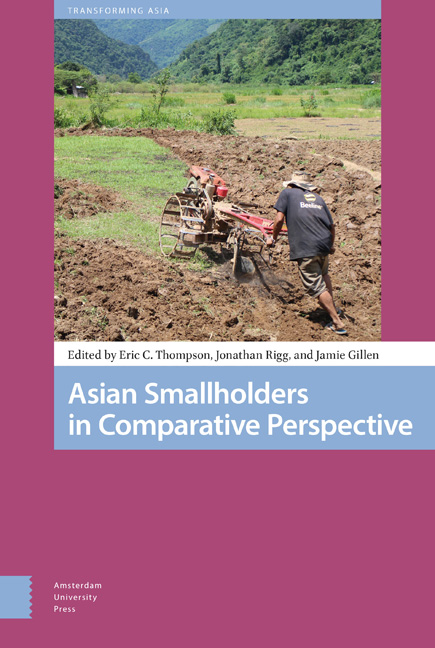Book contents
- Frontmatter
- Contents
- List of Maps, Figures and Tables
- Preface
- Introduction: Asian Smallholders in Comparative Perspective
- 1 Cambodia: Political Strife and Problematic Land Tenure
- 2 Indonesia: Whither Involution, Demographics, and Development?
- 3 Japan: Government Interventions and Part-time Family Farming
- 4 Laos: Responding to Pressures and Opportunities
- 5 Malaysia: The State of/in Village Agriculture
- 6 The Philippines: Fragmented Agriculture , Aquaculture, and Vulnerable Livelihoods
- 7 Singapore: Making Space for Farming
- 8 Taiwan: Toward the Revitalization of Smallholder Agriculture
- 9 Thailand: The Political Economy of Post-Peasant Agriculture
- 10 Vietnam: From Socialist Transformation to Reform
- Index
4 - Laos: Responding to Pressures and Opportunities
Published online by Cambridge University Press: 21 November 2020
- Frontmatter
- Contents
- List of Maps, Figures and Tables
- Preface
- Introduction: Asian Smallholders in Comparative Perspective
- 1 Cambodia: Political Strife and Problematic Land Tenure
- 2 Indonesia: Whither Involution, Demographics, and Development?
- 3 Japan: Government Interventions and Part-time Family Farming
- 4 Laos: Responding to Pressures and Opportunities
- 5 Malaysia: The State of/in Village Agriculture
- 6 The Philippines: Fragmented Agriculture , Aquaculture, and Vulnerable Livelihoods
- 7 Singapore: Making Space for Farming
- 8 Taiwan: Toward the Revitalization of Smallholder Agriculture
- 9 Thailand: The Political Economy of Post-Peasant Agriculture
- 10 Vietnam: From Socialist Transformation to Reform
- Index
Summary
Abstract
A majority of the population of Laos continues to derive their livelihoods from smallholder farming, which remains the backbone of rural society both economically and culturally. Smallholder practices, together with related policy narratives, are profoundly influenced by Laos’ geography, commonly divided between upland and lowland spaces. Accelerating domestic and regional economic integration has altered rural life in diverse ways, particularly over the 2000s. These changes have not only widened opportunities for smallholders through access to markets and improved incomes, but also brought new risks of exclusion from land, exposure to competition, and declining landscape functions. This chapter considers the impacts of policies, resource, and market pressures that have driven both transformation and persistence of smallholder agriculture in Laos.
Keywords: agricultural commercialization, ASEAN integration, concessions, Lao PDR, subsistence, swidden
Smallholder agriculture remains central to the livelihoods of most rural households in the Lao People's Democratic Republic (Lao PDR, hereafter Laos), though increasingly in combination with off-farm and non-farm activities as farm households respond to new pressures and opportunities. While the country's rate of urban expansion is among the fastest in Southeast Asia (World Bank 2015), this is starting from a low base. Of Laos’ relatively sparse population of 7 million people, around two thirds live in rural areas, with 72% of the working population continuing to derive a livelihood, according to official data, from agriculture, forestry, and fishing (LSB 2015). Because of the predominance of small-scale farming in Laos, as well as the widely perceived low socio-economic status of smallholders and particularly the landless rural poor (Saykham 2013), agriculture and forestry have long been prioritized in state planning aimed at reducing rural poverty (MAF 2010). This agriculture- and smallholder-focused approach to addressing rural poverty is in line with much mainstream theory (Dercon 2013). By grounding approaches to poverty reduction in the pursuit of a transition from subsistence to commercially oriented production, Lao smallholders are subjected to both the enabling and constraining effects of state policies, international development practices, and heightened integration with and exposure to regional and global markets (Vandergeest 2003; Rigg 2005; Lagerqvist et al. 2014).
Small-scale farming practices, and thus the areas and types of land cultivated by Lao smallholders, are at the outset profoundly influenced by the country's geography, commonly divided into “upland” and “lowland” spaces in both state planning and development discourse.
- Type
- Chapter
- Information
- Asian Smallholders in Comparative Perspective , pp. 109 - 144Publisher: Amsterdam University PressPrint publication year: 2019



